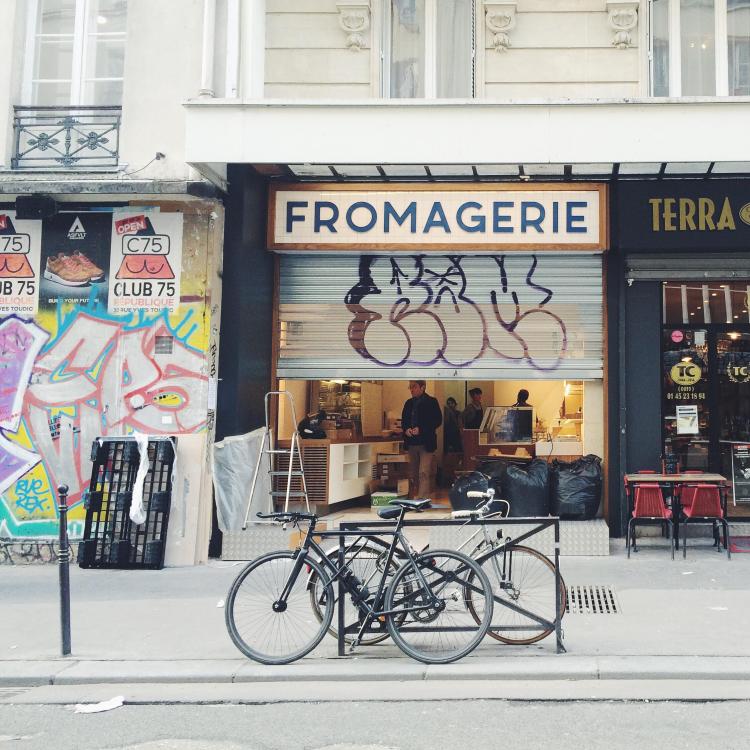Gentrification Comes to Paris — But At What Cost?

Rue du Faubourg Saint Denis in the 10th arrondissement of Paris is full of halal butchers, small "alimentation générale" food shops, and passageways filled with enticing scents of curry and Indian spices. At the end of the street, men sell grilled corn from shopping carts. Near the Porte Saint-Denis, which centuries ago was the north gate into Paris, prostitutes stand chatting in front of stores and bus stops at all hours of the day and night.
This market street — my street — is littered with broken glass and cigarette butts, as the (somewhat sickening) warm smells of raw meat drift onto the sidewalks. It’s a far cry from the posh 7th arrondissement or the intellectual café culture in the Latin Quarter — but that’s part of its charm. Market vendors shout hello at regulars and greet neighbors passing by. Butchers and fishmongers set aside products as people return home from work. Residents regularly talk to, and give food to, the half-blind homeless man who is a fixture in front of grocery stores.
Passage Brady, home to many Indian restaurants in the 10th arrondissement (Photo: Anne Elder/Plume)
At the same time, though, Rue du Faubourg Saint Denis is increasingly home to a younger urban crowd. Urban "bobos" — bourgeois bohemians — crowd the bars wafting with cigarette smoke and loud chatter. A new surge of trendy restaurants is also visible — Paris New York for burgers; Square for bagels; the French American Bakery for brunch, juice and smoothies; and Hutch Hot-Dog House for gourmet hot dogs. Even the names of these establishments indicate a shift in the dining scene that was once so marked by authentic Turkish and Middle Eastern cuisines. The halal butchers and "alimentation" stores are being replaced by specialty épiceries selling homemade ravioli and wine bottles well beyond my price range. Carrefour, Monoprix, and Franprix are beginning to outbid the local halles and small brico stores.
The character of the neighborhood is beginning to transform — and disappear.
Some argue that gentrification is merely modern colonialism. Some say you can prevent becoming a gentrifier by integrating yourself into a community. However, as The Atlantic City Lab pointed out: “Whether or not you say ‘hi’ to your neighbors, your presence in a relatively low-income or blue-collar community will, in fact, make it easier for other college graduates to move in; to open businesses that cater to you; to induce landlords to renovate or redevelop their properties to attract other new, wealthier residents who want access to those businesses.”
This results in one simple fact: long-term neighborhood residents will be pushed out because of steep rents, and the yuppies will move in and bring yuppie dining with them. Maybe there will be less trash on the street and maybe there will be less crime. But there will also be less history as we erase decades of culture and flavor in favor of a homogenized community that fewer and fewer people can afford to profit from.
Now we are seeing a counter-trend, more and more examples of anti-gentrification protests internationally. Just last month, protesters armed with torches — yes, torches — attacked Cereal Killer Cafe, a London restaurant where you can buy a small bowl of Cheerios for only £3 (4€ or $5). The Brick Lane eatery was the scapegoat for an angry mob protesting against the severe economic divide consuming London. As they saw it, cereal was a homogenized weapon against an authentic community.
The Facebook event page for the protest — dubbed a “street party” — said: “We don’t want luxury flats that no one can afford, we want genuinely affordable housing. We don’t want pop-up gin bars or brioche buns—we want community.”
As more yuppie bakeries and restaurants consume the flavors and the communities of Paris, there is an immense risk that the cultures — and the communities — will leave with them, which was the very fear behind those torches in London. There will, as The Guardian said, be less soul: “And when they leave, the city loses its savor: it loses its intoxicating smells, its unique flavors, its ability to interrupt your long night of the soul with life-affirming, belly-filling, joy.”
Though I doubt my street will witness a mob attacking the new eateries with torches, a very real risk of creating a flavorless community looms over Rue du Faubourg Saint Denis -- and the rest of Paris as well.








